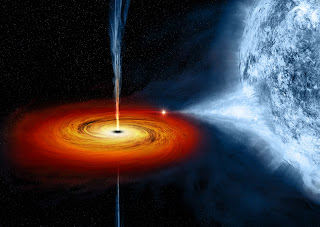A recent science article published by the BBC suggests that, “if you fell into a black hole you might expect to die instantly. But in fact your fate would be far stranger than that.” And strange it is. One might rightly suppose that a region in which spacetime curvature becomes infinite and as such would crush an observer to infinite density would be uniquely, and wholly inhospitable to a human life. Not so, explains science writer Amanda Gefter. Instead, she argues, “the instant you entered into a black hole, reality would split in two. In one, you would be instantly incinerated, and in the other you would plunge on into the black hole utterly unharmed.” What is the lay person to make of such an enigmatic exposition of reality? How could we find such an assertion to be anything other than emotionally unmooring? Nonetheless, there it is: another scientific proposal that mutually exclusive realities can exist concurrently - that the impossible is real.
Jewish theology has long encouraged its adherents to openly embrace paradox. For instance, there’s the problem of God’s foreknowledge of the future vs the Torah’s absolute insistence on free will. Then there’s the even more fundamental problem of how it can be that a finite world such as ours can exist concurrently with an Infinite being? Additionally, there’s the problem of having a text (The Torah) with immutable commandments that exists alongside a human construct (the Talmud) which implies that the majority interpretation of that text governs, no matter how outlandish or deviant from surface meaning. At first blush, like with the new black hole theory, something seems off. These ideas are essentially contradictory. How can they both be true?
Although there is a voluminous amount of literature contemplating these paradoxes, a common response to such questions is that it’s simply not possible, from our vantage point, to gain a full accounting of the true nature of the universe. In the same way that there is no mechanical possibility of ever knowing (in a physical sense) if there are universes outside of our own, so too, to truly understand how the finite and the Infinite can co-exist we would need to have the vantage point of the Infinite Himself - which, clearly, we do not. We cannot imagine a color that does not exist nor a ten-sided circle, or even the true appearance of subatomic particles. As Werner Heisenberg said of the famous wave/duality paradox in physics, “the solution to the difficulty is that the two mental pictures which experiment lead us to form - the one of the particles, the other of the waves - are both incomplete and have only the validity of analogies which are accurate only in limiting cases.”
So, on the one hand, all of this could generate a decent amount of angst. Lack of clarity tends to be disconcerting and the notion that no matter how hard we work, there will always be some (critical) matters of which we will remain incapable of true understanding is highly unsatisfying. On the other hand, it opens up the door to a lot of interesting possibilities. Perhaps this is me, speaking through my theology-colored glasses, but it seems to me that with theories such as the black hole assertion described above, modern physics unwittingly posits evidence for life after death. How so? With the description of the “event horizon” - the point of inevitability - beyond which anything (including light) that crosses cannot return - we have a metaphor for life in general. Death is an inevitability against which, at present, we have no recourse. Yet what if, as is now being posited, when we cross death’s “event horizon,” reality splits "into two?" In one, your body decomposes under six feet of earth; in the other, you are “utterly unharmed.”
Obviously, there are dissimilarities in the two examples. With death, there is no breakdown of the laws of physics due to massive gravitational force and the resulting paradoxical “weirdness” that it seems to suggest. But with science’s new-found embrace of paradox it makes it much more of a plausible notion to suggest that two opposites - life and death - could, somehow, be simultaneously true. Most theological traditions take it as a given that this is indeed the case. The scientific mechanism for this has yet to be discovered but give it time. It can’t be any odder than what is currently being discussed.


Dear Rabbi,
ReplyDeleteYou say - Jewish theology has long encouraged its adherents to openly embrace paradox.
And Christians can say they have long encouraged its adherents to openly embrace paradox. Example - God is one yet three. Paradox also occur in Asian religions.
Also dear Rabbi, Scientific paradoxes are rooted in empirical data. And they may be eventually resolved with more data and improved scientific theories. Theological paradoxes are not rooted in empirical data, not rooted in scientific theory, but instead are rooted in religious dogma and the speculations of ancient superstitious peoples.
The Truth is G-d’s Seal
And my response: http://shakenfaithless.blogspot.com/2015/06/religion-just-some-speculations-of-some.html
ReplyDelete